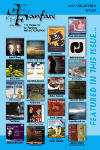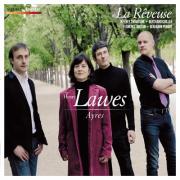Texte paru dans: / Appeared in: |
|
| "highly recommended" | |
|
Reviewer: Barry
Brenesal
Mention of a composer named
Lawes brings to mind William Lawes (1602-1645), the favorite musician of
Charles I, and a Royalist soldier who died in combat. But his older brother
Henry (1595-1662) was also held in high regard. He received an appointment
as Gentleman to the Chapel Royal, and survived long enough to compose an
anthem on the coronation of Charles II. Lawes was commended for his
sensitive word-settings; so much so, that Ben Jonson, John Donne, and John
Milton among others sought him out. Milton went so far as to write a famous
sonnet, “To Mr. H. Lawes, on his Aires,” commending the composer who “First
taught our English Musick how to span/words with just note and accent, not
to scan/with Midas Ears, committing short and long.” Lawes wasn’t simply a
songwriter, in other words. He set texts to music in a manner that followed
the poet’s own phrasing.
Little enough of Lawes’s music
exists in the current record catalog, aside from an occasional consort or
lute song on a collection disc, or one that shares the spotlight with his
brother (of which, more later). This release, then, is welcome on the
grounds of fresh content. Nor does its composer disappoint: whether it’s
heartbreak, mourning, the sorrows of parting, or the smugly witty, impetuous
confidence so typical of the cavalier poets, Lawes usually finds a memorable
setting. He makes distinct what might have been generic in another’s work;
so texts that are ostensibly similar in their expressive ends are analyzed
and reassembled with all the musical tools at the disposal of composers of
Lawes’s time and place. He is also adept at creating a structure suitable to
each work, whether the setting is as simple and unified as in Have you e’er
seen the morning sun, or as complex and detailed as in two poems by Robert
Herrick, Whither all her false oaths blown and I’m sick of love. Something
of the power of his Italian operatic contemporaries can be caught in the
latter. It’s a shame English culture of the time provided Lawes with no
opportunity to try his hand at opera. La Rêveuse is a new name to me, though they have been twice reviewed in Fanfare. Robert Maxham (Fanfare 34:2; Mirare 105) thought well of their program of early 18th-century French instrumental chamber music, and Bertil van Boer (Fanfare 35:4; Mirare 125) thought their disc of oratorios and instrumentals by Brossard was “excellent.” This release of consort songs places the spotlight on tenor Jeffrey Thompson, who possesses an attractive lyric tone, good agility and ornamentation, and excellent control of dynamics. He turns in wonderfully brash performances of Out upon it, I have lov’d, and readings rich in soft colors for such melancholy pieces as Slide soft your silver floods. The more dramatic ones that approach recitative, such as O tell me love bring forth an appropriately vivid response. He is ably seconded by the other members of La Rêveuse, who in turn perform very well a series of solo and group instrumentals interspersed throughout the program. My only regret is that the disc ends with William Lawes’s Why so pale and wan, fond lover. Since the album is devoted to Henry Lawes, a more fitting conclusion might have been his Cease you jolly shepherds, in tribute to his brother upon the latter’s death. The only competition out there is a previously mentioned disc split mainly between the Lawes brothers, and featuring countertenor Robin Blaze (Hyperion 67589). I’ve previously expressed pleasure with his performance as Paris in Caldara’s Il più bel nome (Glossa 920310), but he seems far too reticent in Lawes’s airs to convey the expressive extremes characteristic of the period’s arts. That can’t be said of Thompson, or of La Rêveuse in general. With good, balanced sound and full texts, this is highly recommended. | |
|
|
|
|
|
|
|
Cliquez l'un ou l'autre
bouton pour découvrir bien d'autres critiques de CD |
|




